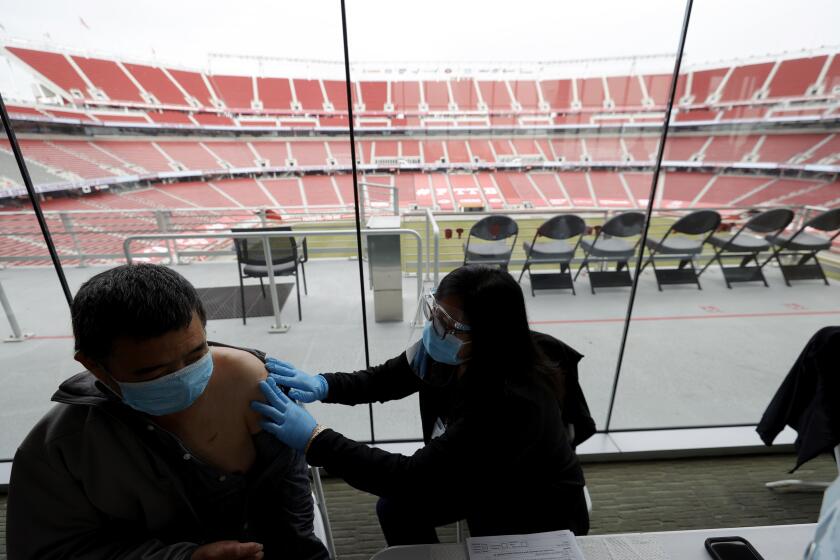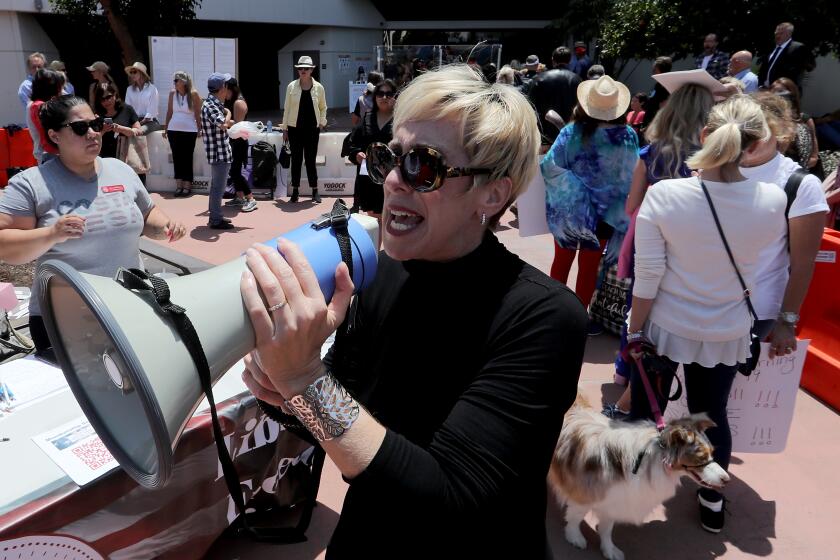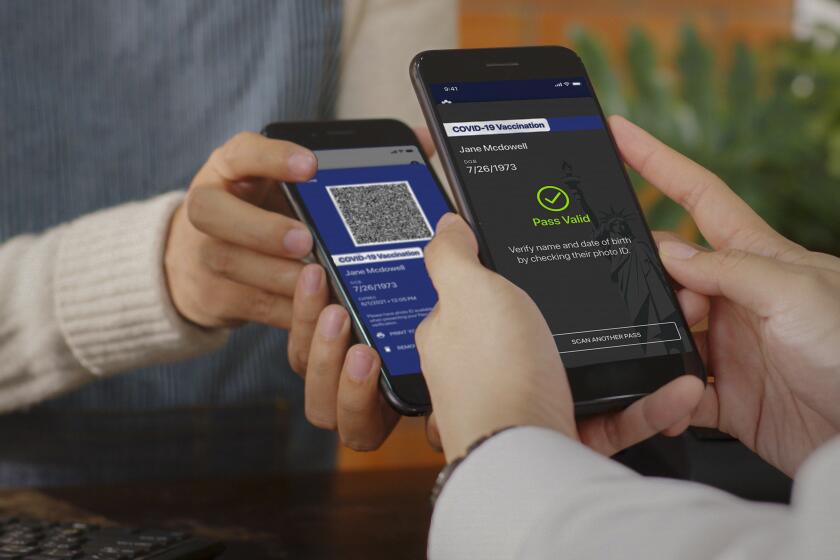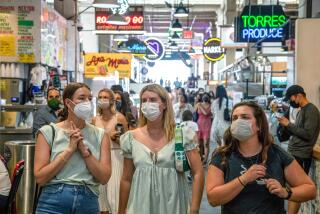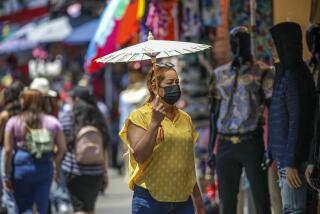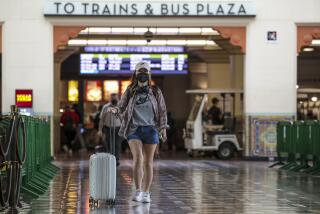Huntington Beach restaurant urges unvaccinated diners in rebuff of COVID precautions
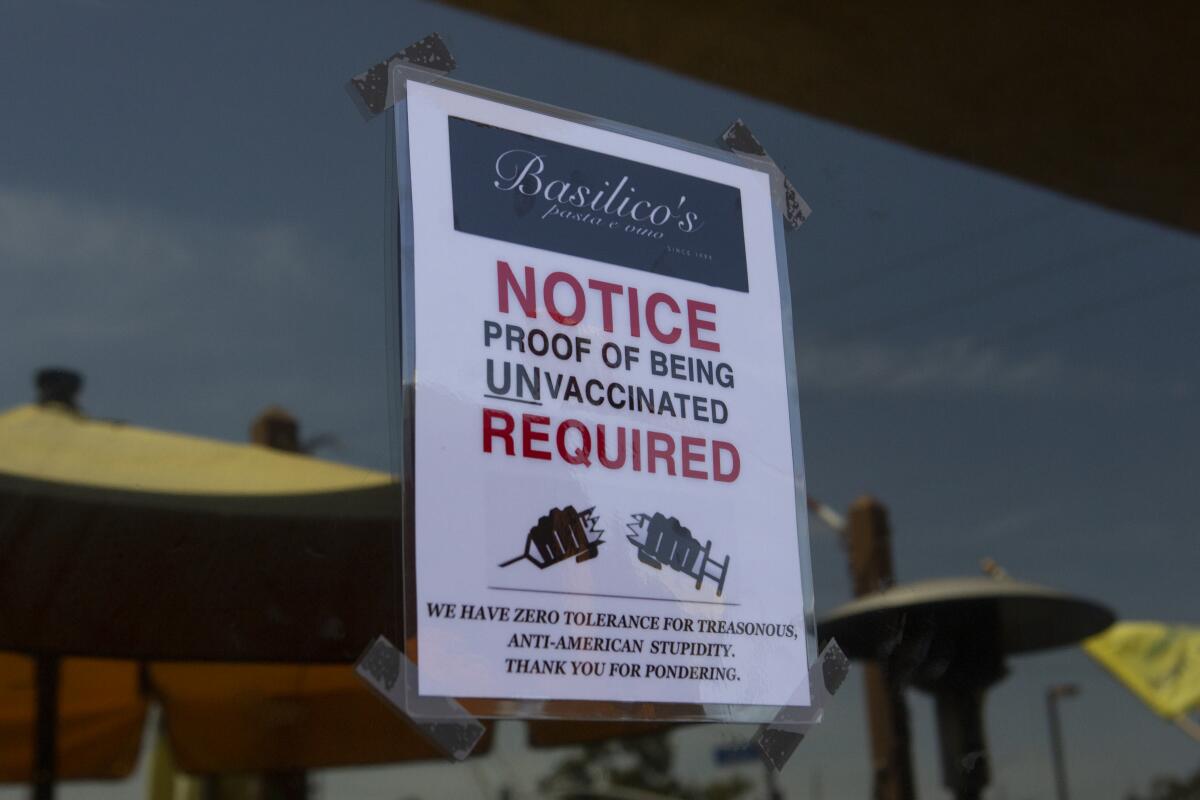
When restaurants across California halted indoor dining as the COVID-19 pandemic took hold in March 2020, Basilico’s Pasta e Vino in Huntington Beach continued to welcome patrons.
When officials issued an order for establishments to mandate face coverings to stem the spread of the virus, the Orange County eatery declared itself a mask-free zone and required that diners remove them before entering.
This week, the Italian restaurant issued another decree: Proof of being unvaccinated is required for entry.
Two signs bearing the message were taped to the windows of the restaurant, which is nestled between a gym and a sustainable beauty salon in a small strip mall at Hamilton Avenue and Brookhurst Street.
“We have zero tolerance for treasonous, anti-American stupidity,” the signs read.
A Costa Mesa bar owner has become the first Orange County proprietor to face a criminal charge for illegally operating during the COVID-19 pandemic.
Although an employee confirmed the eatery is not actually checking patrons’ vaccine status, the signs appear to be a poke in the eye to those who support vaccinations and other measures to stem the growing spread of the virus.
It also is a powerful illustration of the backlash against vaccines in some quarters, despite overwhelming evidence they are safe and a strong protection. Officials have been fighting to get more people vaccinated as COVID-19 infections rise but are facing skepticism, misinformation and political opposition from the right.
Some Republicans and far-right figures have openly fought against vaccines, sometimes turning to unproved science and conspiracy theories.
President Biden last week targeted social media platforms like Facebook for allowing the spread of misinformation about the vaccines. “They’re killing people,” he said of the skeptics.
Basilico’s owner, Tony Roman, said in an email that he was fighting government policies he says are harmful.
“With warning signs of another impending lockdown, and many business owners again emboldening those who I refer to as ‘the lockdown tiny tyrants’ — this time by imposing proof-of-vaccination policies — we chose to fire another missile of defiance to further make our point in defense of American liberty and freedom,” he said.
The restaurant’s latest act of resistance comes amid a troubling rise of coronavirus cases that emerged after the state’s June 15 reopening and coincided with increased circulation of the Delta variant, which has stoked concern among public health experts.
Over the last week, the state has reported an average of nearly 5,000 new coronavirus cases a day, more than quadruple the number from a month ago, according to data compiled by The Times.
In late June, the state was recording about 6,000 new cases a week, according to a Times analysis. At the height of the pandemic, more than 300,000 new coronavirus cases were being reported statewide over a seven-day period.
U.S. pro teams are struggling to get their COVID-19 vaccination rates to 85%, a threshold considered high enough to curtail spread of the disease.
Orange County appears to be trending in the same direction. On July 15, the county recorded 328 new infections. It’s a daily number that hadn’t been seen since February — though it’s still far less than the peak of the pandemic, county data show.
The increase in infections has prompted some Southern California businesses to require that patrons provide proof of vaccination or a negative COVID-19 test.
Bar Henry, an Echo Park cocktail bar known for its live music, became one of more than a dozen establishments in Los Angeles County in the last week to require such proof.
“Let’s do what we can together to avoid taking steps backwards,” the bar wrote in a post on Instagram.
Pasadena recently announced plans to require all city employees be vaccinated against COVID-19 once the shots receive federal approval.
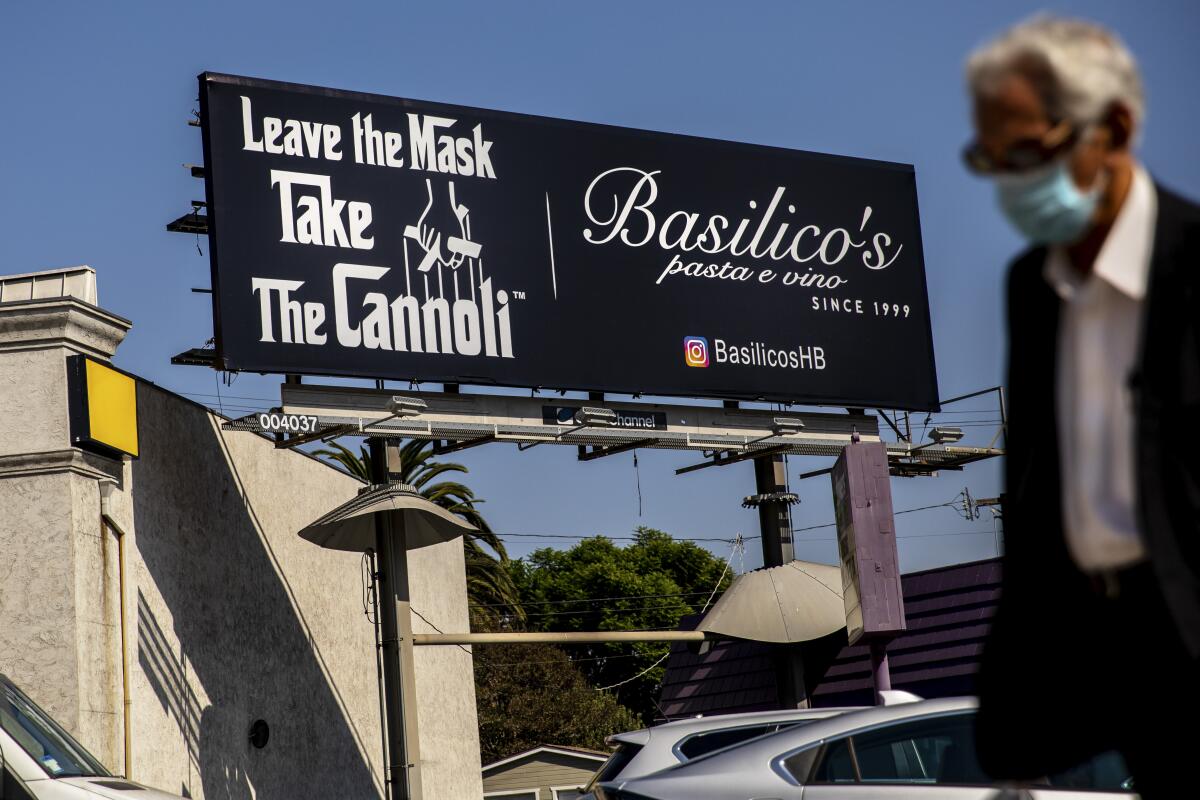
Basilico’s rejection of public health measures symbolizes how strongly anti-vaccination culture has taken hold in traditionally conservative enclaves such as Orange County, where distrust of government and outlandish social media claims have sparked outrage throughout the pandemic.
About 55% of Orange County residents are fully vaccinated, and about 62% are at least partially vaccinated, according to county data.
Vaccinated people are protected from severe disease, hospitalization and death from COVID-19. Experts have said the worst effects of the recent uptick in cases have fallen almost exclusively on the unvaccinated.
Still, some who oppose the vaccine and mask mandates see it through a lens of government overreach and anti-liberty, said Pete Simi, a sociology professor at Chapman University.
“It seems more prominent in Orange County, and it affects the county more broadly at all levels,” Simi said. “For example, officials in Orange County are less aggressive with initiating public health measures that might be viewed as restrictive.”
Groups espousing an array of views — including anti-mask and anti-vaccine sentiments — have mobilized at county Board of Supervisors meetings for more than year to oppose measures aimed at slowing the spread of the virus. They have protested with banners evoking Nazi imagery and megaphones in front of the homes of politicians and public health officials who have openly disagreed with them. A county health officer quit last year after protesters showed up at her house because of her support of a mask mandate.
In May, hundreds of protesters descended on a Board of Supervisors meeting to oppose a pilot “passport” program in which COVID-19 vaccination records could be stored online so they could be easily accessed on smartphones.
The debate in Orange County signifies continuing skepticism toward the government’s handling of COVID-19 and speaks to the larger politicization that has plagued nearly every other aspect of the pandemic.
Despite assurances from officials, the program became a rallying cry for the anti-vaccination movement. Some opponents insisted the passports could be used to “track” people, reveal private health information and enable the county and businesses to favor residents who choose to get vaccinated.
Leigh Dundas, a lawyer known for fighting against childhood immunization laws, likened the program to “Nazi Germany” at a Board of Supervisors meeting.
“It is show me your papers please before you pass. It is an electronic dog collar. And since when did Orange County become the People’s Republic of China?” she said to the board.
The outrage was so severe that four of the five county supervisors voted to halt the development of the program. Supervisor Katrina Foley, who supported moving forward, said the county was appeasing a “very small faction” of the community at the expense of others.
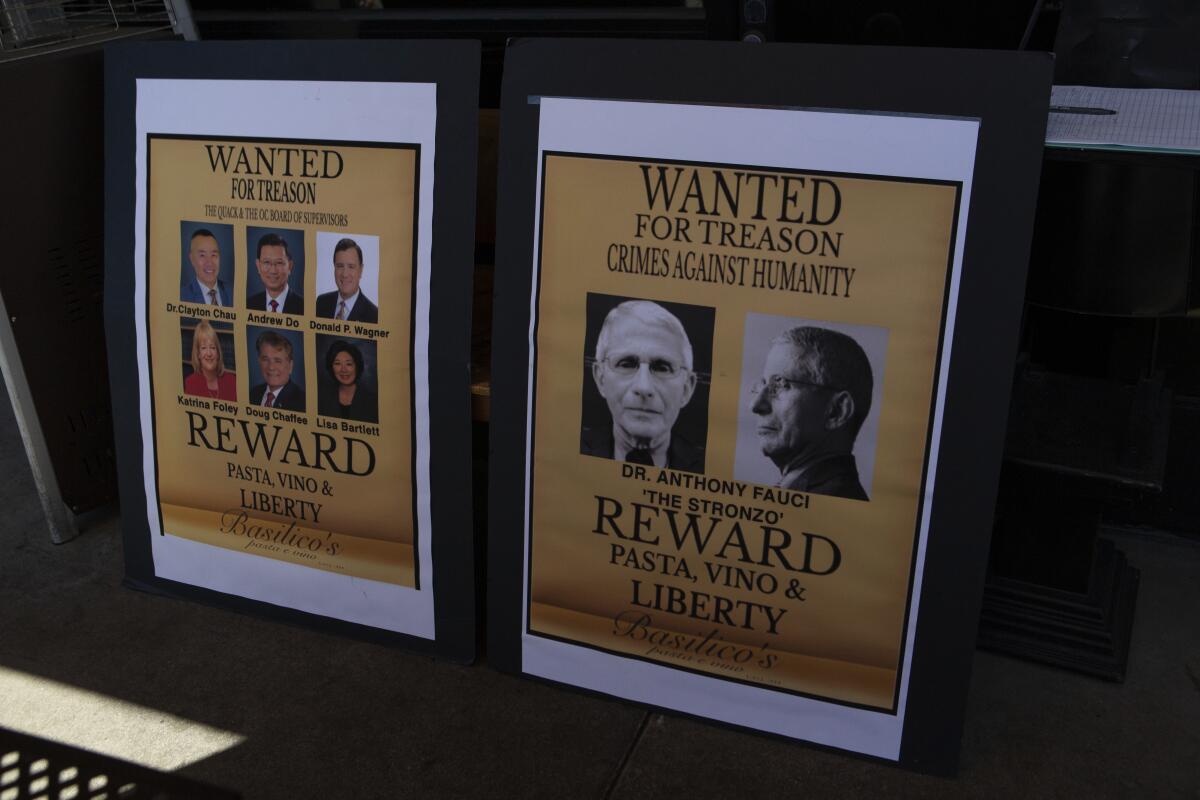
In June, Basilico’s began advertising $25 T-shirts with the phrase “Leave the vax, take the cannoli,” a play on a line from “The Godfather” film, next to an illustration of a hand controlling a Marionette.
A similar sentiment from the restaurant — “Leave the mask, take the cannoli” — appeared on a billboard along La Cienega Boulevard in Los Angeles last year.
“Imagine if Americans would have refused mask mandates, or better even banned the masks like we have throughout the lockdowns,” the eatery posted on Instagram. “The tiny tyrants then would have never dared to think they could try and force vaccine mandates.”
Basilico’s small patio and indoor dining space was empty around noon Wednesday. A reporter was directed to remove her mask if she wanted to enter the establishment. Signs denoting the establishment’s no-mask policy were affixed to its windows.
When a photographer asked to take pictures inside, an employee declined, instead setting out “wanted for treason” posters featuring the Orange County Board of Supervisors, Dr. Anthony Fauci, the director of the U.S. National Institute of Allergy and Infectious Diseases, and California Gov. Gavin Newsom.
The California Department of Alcoholic Beverage Control launched an investigation into the restaurant in July 2020 after receiving a complaint about the business, said John Carr, a spokesman for the department.
The agency declined to elaborate about the nature of the complaint, but it moved forward with an administrative procedure against Basilico’s, which could result in a penalty ranging from fines to the revocation of the restaurant’s liquor license. Officials declined to comment further, citing pending litigation.
The state Division of Occupational Health and Safety, known as Cal/OSHA, levied more than $152,000 in fines against the restaurant based on a series of violations, including failing to establish a COVID-19 prevention program, not providing safety training and not providing masks for employees, according to state records.
Roman has not appealed the citations. In a video posted to the restaurant’s Instagram in July, the owner made clear that he does not intend to pay the fines to the “American traitors at OSHA.”
The federal government isn’t willing to make a digital pass or app that attests to a person’s vaccination status. Several companies are trying to fill the void.
As Basilico’s continues to enforce its no-mask policy, the uptick in recent COVID cases has put renewed focus on face coverings.
One-third of California counties have begun to urge even fully vaccinated people to wear face coverings indoors. Los Angeles County and the cities of Long Beach and Pasadena, which have independent health departments, have gone a step further and mandated the practice.
The Orange County Health Care Agency said earlier this month that no mask mandate for unvaccinated people is in the works. In accordance with state guidance, the county requires unvaccinated individuals to wear face coverings in public settings.
However, some officials are becoming increasingly concerned about the enforcement of that rule.
“If you come in without a mask, it’s assumed you are vaccinated,” Foley said. “But the same people come up to the podium and say they’re against vaccines. As we see the number of cases increase among the unvaccinated and even the vaccinated, it’s putting our employees and the other people who are coming to the meetings at risk.”
More to Read
Sign up for Essential California
The most important California stories and recommendations in your inbox every morning.
You may occasionally receive promotional content from the Los Angeles Times.
